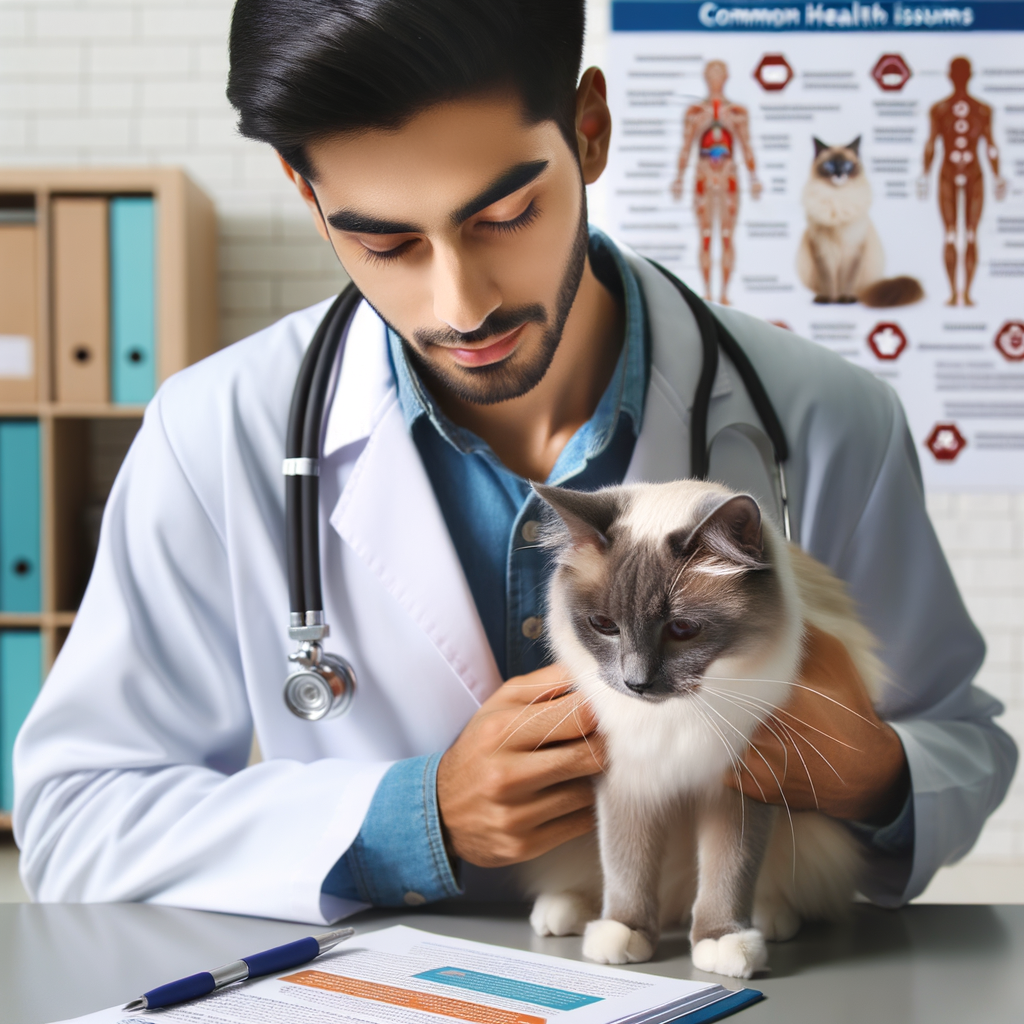
Introduction to Siamese Cat Health
Siamese cats are known for their striking features and playful personalities. However, like all breeds, they have their own unique health needs. In this article, we will explore the importance of maintaining Siamese cat health and discuss some common health issues that these felines often face.
- Importance of maintaining Siamese Cat Health
Siamese cats are not just pets; they are part of our families. Therefore, their health is of utmost importance. Regular check-ups, a balanced diet, and plenty of exercise can help ensure your Siamese cat lives a long and healthy life. Moreover, understanding their specific health needs can help prevent the onset of diseases and reduce veterinary costs in the long run.
- Common Siamese Cat Health Issues
Siamese cats are generally healthy, but they are prone to certain health issues. Some of the most common include respiratory problems, dental diseases, and genetic disorders like Progressive Retinal Atrophy (PRA), which can lead to blindness. Early detection and treatment of these issues can significantly improve your cat’s quality of life.
In the following sections, we will delve deeper into understanding Siamese cat health checks, provide a comprehensive guide to Siamese cat care, help you recognize Siamese cat symptoms, and discuss common Siamese cat diseases. We will also provide tips on veterinary care and share some health tips to ensure your Siamese cat stays in the best possible shape.
Understanding Siamese Cat Health Check
Keeping your Siamese cat healthy involves regular health checks. These checks are crucial in detecting any potential health issues early and ensuring your cat lives a long, happy life. Let’s delve into what you can expect during a Siamese cat health check.
What to Expect During a Siamese Cat Health Check
A Siamese cat health check typically involves two main components:
- Veterinary examination
Your Siamese cat will undergo a thorough physical examination by a professional vet. This examination includes checking the cat’s weight, temperature, heart rate, and breathing. The vet will also examine the cat’s skin, coat, eyes, ears, teeth, and gums for any signs of disease or infection. This comprehensive examination helps in early detection of potential health issues.
- Discussion of Siamese Cat Health Problems
Siamese cats, like any other breed, can be prone to certain health problems. During the health check, your vet will discuss these potential health issues with you. This discussion will include information on common Siamese cat diseases, their symptoms, and preventive measures. This knowledge will equip you to better care for your Siamese cat and ensure its well-being.
Remember, regular health checks are key to your Siamese cat’s overall health. They not only help in early detection of diseases but also provide an opportunity to discuss any concerns you may have about your cat’s health with a professional.
Frequency of Siamese Cat Health Check
Understanding the frequency of health checks for your Siamese cat is crucial to ensure their overall well-being. Regular check-ups and emergency visits are two primary aspects of maintaining your Siamese cat’s health.
- Regular Check-ups
Regular check-ups are a fundamental part of your Siamese cat’s health care routine. These visits allow your vet to monitor your cat’s health and detect any potential issues early. Ideally, Siamese cats should have a regular check-up at least once a year. However, for kittens or older cats, more frequent visits may be necessary. Regular check-ups often include a comprehensive physical examination, weight check, dental check, and vaccinations.
- Emergency Visits
Emergency visits are unplanned and occur when your Siamese cat is unwell or injured. These visits are crucial to address immediate health concerns and prevent further complications. Symptoms that may warrant an emergency visit include sudden changes in behavior, loss of appetite, difficulty breathing, or visible injuries. Always remember, when it comes to your Siamese cat’s health, it’s better to be safe than sorry. If you notice any alarming signs, don’t hesitate to seek immediate veterinary care.
In conclusion, maintaining the health of your Siamese cat involves a balance of regular check-ups and being vigilant for signs that may require emergency visits. By understanding the frequency of these health checks, you can ensure your Siamese cat lives a long, healthy, and happy life.
Siamese Cat Care: A Comprehensive Guide
When it comes to caring for your Siamese cat, understanding their unique nutritional needs is crucial. In this section, we will delve into the importance of a balanced diet and the common dietary health issues that Siamese cats may face.
Nutrition and Siamese Cat Health
Just like humans, Siamese cats require a balanced diet to maintain good health. The right nutrition can help prevent a variety of health problems and ensure your cat lives a long, happy life.
- Importance of a Balanced Diet
A balanced diet for a Siamese cat should include proteins, carbohydrates, fats, vitamins, and minerals. Proteins are essential for growth and repair, while carbohydrates provide energy. Fats are a concentrated source of energy and help absorb vitamins. Vitamins and minerals are necessary for various bodily functions.
Feeding your Siamese cat a balanced diet can help maintain a healthy weight, promote a shiny coat, support a strong immune system, and contribute to overall good health. Remember, each cat is unique, and their dietary needs may vary based on age, activity level, and health status.
- Common Dietary Siamese Cat Health Issues
Siamese cats are prone to certain dietary health issues. Obesity is one of the most common problems, often due to overfeeding or lack of exercise. Obesity can lead to other health issues like diabetes, heart disease, and arthritis.
Another common issue is food allergies. Siamese cats may be allergic to certain types of food, leading to skin problems, digestive issues, and other symptoms. If you notice any changes in your cat’s behavior, appetite, or physical condition, it’s essential to consult with a vet.
Understanding the nutritional needs of your Siamese cat and being aware of common dietary health issues can go a long way in ensuring their wellbeing. Remember, a healthy cat is a happy cat!
Exercise and Siamese Cat Health
Exercise plays a vital role in maintaining the health and happiness of your Siamese cat. Let’s explore the benefits of regular exercise and some potential health problems related to it.
- Benefits of Regular Exercise
Regular exercise is crucial for your Siamese cat’s overall health. It helps to:
- Maintain a Healthy Weight: Exercise helps burn calories, preventing obesity, a common health issue in Siamese cats.
- Improve Muscle Tone and Strength: Active play helps your cat build strong muscles and improve their agility.
- Enhance Mental Health: Exercise can reduce signs of stress and anxiety in cats, leading to a happier and more content pet.
- Promote Healthy Digestion: Regular physical activity can help prevent constipation and other digestive issues.
- Exercise-related Siamese Cat Health Problems
While exercise is generally beneficial, it’s important to be aware of potential health problems that can arise if not done properly:
- Overexertion: Siamese cats are energetic, but excessive exercise can lead to exhaustion or heatstroke, especially in hot weather.
- Injury: High-impact activities can potentially cause injuries. Always ensure your cat’s play area is safe and free from hazards.
- Stress: Forced exercise can cause stress and anxiety. It’s important to let your cat set their own pace and make exercise fun.
In conclusion, exercise is a key component of your Siamese cat’s health regimen. However, it’s important to strike a balance and ensure your cat is exercising safely. Always monitor your cat during play and adjust activities as needed to prevent any potential health problems.
Recognizing Siamese Cat Symptoms
As a Siamese cat owner, it’s crucial to be aware of the signs that your feline friend may be unwell. Early detection of symptoms can lead to quicker treatment and a better prognosis. In this section, we will discuss the physical symptoms to look out for in your Siamese cat.
Physical Siamese Cat Symptoms
Physical symptoms are often the first signs that your Siamese cat may be experiencing health issues. These can manifest as changes in their appearance or behavior.
- Changes in Appearance
One of the first things you might notice is a change in your Siamese cat’s appearance. This could be anything from a dull coat, weight loss, or even noticeable lumps or bumps. A healthy Siamese cat should have a shiny coat, clear eyes, and a healthy weight. Any drastic changes in these areas should be a cause for concern and warrant a visit to the vet.
- Changes in Behavior
Changes in your Siamese cat’s behavior can also be a sign of underlying health issues. This could include lethargy, increased aggression, or a sudden lack of interest in activities they once enjoyed. Remember, you know your cat best. If they’re acting out of the ordinary, it’s worth getting them checked out.
Keep in mind that these symptoms can be subtle and may develop gradually. Regular check-ups with your vet can help catch any potential issues early. Stay vigilant and remember that your Siamese cat’s health is a priority.
Behavioral Siamese Cat Symptoms
It’s important to understand that changes in your Siamese cat’s behavior can be a sign of health issues. Two key behavioral symptoms to watch out for include changes in eating habits and activity levels.
- Changes in Eating Habits
Siamese cats are known for their hearty appetites. If your cat suddenly loses interest in food or starts eating more than usual, it could be a sign of a health problem. For instance, a decrease in appetite could indicate dental issues or gastrointestinal problems, while an increase might be a symptom of conditions like diabetes or hyperthyroidism.
- Changes in Activity Level
Siamese cats are typically active and playful. If your cat seems lethargic or less interested in play, it could be a sign of illness. On the other hand, increased restlessness or hyperactivity could also indicate a health issue, such as hyperthyroidism. Always pay attention to sudden changes in your cat’s energy levels.
In conclusion, being aware of your Siamese cat’s normal behavior is crucial in spotting potential health issues early. If you notice any changes in your cat’s eating habits or activity levels, it’s best to consult with a veterinarian immediately.
Common Siamese Cat Diseases
Siamese cats, like any other breed, are susceptible to certain health conditions. Understanding these common diseases can help you take better care of your feline friend. Here are some of the most common diseases found in Siamese cats:
- Respiratory Diseases
Respiratory diseases are quite common in Siamese cats. They can be caused by various factors, including viruses, bacteria, and allergens. Symptoms may include sneezing, coughing, and difficulty breathing. If you notice any of these signs, it’s essential to take your cat to the vet immediately.
- Cardiac Diseases
Siamese cats are also prone to cardiac diseases, such as hypertrophic cardiomyopathy. This condition causes the heart muscle to thicken, making it harder for the heart to pump blood. Symptoms can include lethargy, loss of appetite, and rapid breathing. Regular vet check-ups can help detect this disease early.
- Genetic Diseases
Some diseases in Siamese cats are genetic, meaning they are passed down from parent to offspring. One such disease is progressive retinal atrophy, a condition that can lead to blindness. Regular eye exams can help detect this disease early and manage its progression.
Remember, early detection is key in managing these diseases. Regular vet visits and being aware of your Siamese cat’s behavior can help ensure they live a long, healthy life.
Siamese Cat Veterinary Care
When it comes to the health of your Siamese cat, regular veterinary care plays a crucial role. It’s not just about treating health problems when they arise, but also about preventing them in the first place.
Importance of Regular Veterinary Care
Regular veterinary care is essential for the overall health and well-being of your Siamese cat. It’s not just about responding to health problems, but also about preventing them. Let’s delve into the two main aspects of regular veterinary care:
- Preventive Care
Preventive care is all about keeping your Siamese cat healthy before any health issues arise. This includes regular check-ups, vaccinations, and routine tests. These visits can help detect potential health problems early, allowing for timely treatment and better outcomes. They also provide an opportunity for your vet to educate you on the best ways to care for your Siamese cat at home.
- Treatment of Siamese Cat Health Problems
Despite our best efforts, Siamese cats can still develop health problems. Some common issues include respiratory diseases, dental diseases, and genetic disorders. Regular veterinary care ensures that these problems are treated promptly and effectively. Your vet can provide a range of treatments, from medication to surgery, depending on the severity of the health problem.
In conclusion, regular veterinary care is a vital part of keeping your Siamese cat healthy. It’s not just about treating health problems, but also about preventing them. By taking your Siamese cat to the vet regularly, you’re giving them the best chance at a long, healthy life.
Choosing the Right Veterinarian for Your Siamese Cat
When it comes to the health of your Siamese cat, choosing the right veterinarian is crucial. There are two key factors to consider:
- Experience with Siamese Cats
- Proximity to home
Experience with Siamese Cats
Siamese cats have unique health needs and characteristics. Therefore, it’s important to find a veterinarian who has experience with this breed. A vet with Siamese cat experience will be more familiar with the common health issues these cats face. They’ll also be better equipped to provide preventative care and treatment.
For example, Siamese cats are more prone to certain diseases like progressive retinal atrophy and asthma. A vet with experience in treating Siamese cats will be able to recognize the early signs of these conditions and provide appropriate care.
Proximity to Home
The location of the vet clinic is another important factor to consider. In case of an emergency, you’ll want to be able to get your Siamese cat to the vet as quickly as possible. Therefore, it’s advisable to choose a vet clinic that’s close to your home.
Additionally, regular vet visits can be stressful for your cat. A shorter journey can help reduce this stress. Remember, a calm cat will be more cooperative during check-ups, making the vet’s job easier and the visit more productive.
In conclusion, when choosing a vet for your Siamese cat, consider their experience with the breed and the clinic’s proximity to your home. These factors will ensure your cat gets the best possible care.
Siamese Cat Health Tips
Siamese cats are known for their striking features and playful personalities. However, like all pets, they require specific care to maintain their health. Here are some essential tips to help keep your Siamese cat in the best possible condition.
- Keeping your Siamese Cat active
Siamese cats are naturally active and curious. They love to play and explore their surroundings. To keep your Siamese cat healthy, it’s important to provide them with plenty of opportunities for physical activity. This could include interactive toys, climbing trees, or even a game of chase with a laser pointer. Regular play sessions will not only keep your cat physically fit but also mentally stimulated.
- Providing a balanced diet
Feeding your Siamese cat a balanced diet is crucial for their overall health. This breed has a fast metabolism, so they require a diet rich in protein. Avoid giving them human food as it may contain ingredients harmful to cats. Instead, opt for high-quality cat food that meets all their nutritional needs. Remember, each cat is unique, so consult with your vet to determine the best diet for your pet.
- Regular health checks
Regular vet visits are a key part of maintaining your Siamese cat’s health. These check-ups allow your vet to monitor your cat’s weight, check for any potential health issues, and keep them up-to-date on vaccinations. It’s recommended that you take your Siamese cat for a health check at least once a year. However, if you notice any changes in your cat’s behavior or appearance, schedule a vet visit immediately.
By following these tips, you can ensure your Siamese cat lives a long, healthy, and happy life. Remember, your cat relies on you for their well-being, so it’s important to take these responsibilities seriously.
Conclusion: Your Siamese Cat Health Guide
As we draw our comprehensive guide to a close, it’s important to remember that your Siamese cat’s health is paramount. We’ve covered a lot of ground, from understanding health checks to recognizing symptoms and diseases, and how to provide the best care for your feline friend. Let’s summarize the key takeaways and share some final thoughts on Siamese cat health.
- Key Takeaways
Throughout this guide, we’ve learned that:
- Regular health checks are essential for early detection of potential health issues.
- Proper care, including a balanced diet and regular exercise, can significantly improve your Siamese cat’s health and longevity.
- Recognizing symptoms early can help in timely treatment, reducing the risk of severe diseases.
- Common diseases in Siamese cats include respiratory issues, dental diseases, and heart diseases.
- Veterinary care plays a crucial role in maintaining your Siamese cat’s health.
- Final Thoughts on Siamese Cat Health
Siamese cats are a unique breed with specific health needs. By understanding these needs, you can provide the best care for your pet. Remember, a healthy cat is a happy cat. So, make your Siamese cat’s health a priority, and you’ll enjoy many years of companionship and love.
In conclusion, caring for a Siamese cat requires knowledge, patience, and love. With this guide, we hope you feel better equipped to take on this rewarding responsibility. Remember, your efforts will not only ensure a healthier life for your Siamese cat but also a stronger bond between you and your feline friend.








